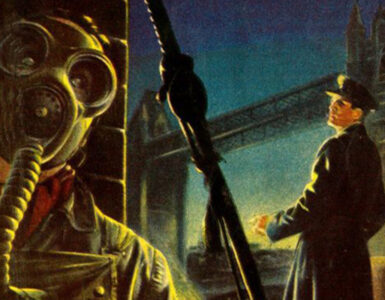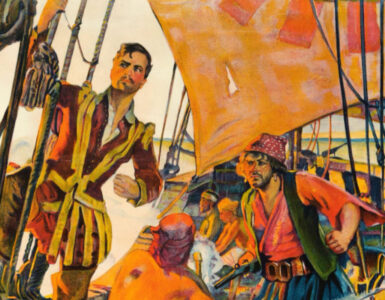 Over the last four days, we’ve been offering you a glimpse at the various themes that we’ll be exploring at this year’s PulpFest. “Summer’s AMAZING Pulp Con” will take place from July 21st through July 24th in the Columbus, Ohio Arena district at the Hyatt Regency hotel and the city’s spacious convention center.
Over the last four days, we’ve been offering you a glimpse at the various themes that we’ll be exploring at this year’s PulpFest. “Summer’s AMAZING Pulp Con” will take place from July 21st through July 24th in the Columbus, Ohio Arena district at the Hyatt Regency hotel and the city’s spacious convention center.
We’ve been also providing clues to the identity of this year’s PulpFest Guest of Honor: he or she has worked for the specialty or genre-fiction magazines and for both the rough-paper and slick magazines. He or she has also been associated with super-heroes and the science-fiction genre. Still wondering? Here’s one more clue: he or she was the editor of the magazine pictured here, the May 1969 issue of AMAZING STORIES.
Give up? That’s okay because we had everyone stumped. The Guest of Honor for PulpFest 2016 will be author, editor, musician, and science-fiction and pulp fan Ted White.
Born February 4, 1938, Theodore Edwin White is a Hugo Award-winning American writer, best known as a science-fiction author and editor and as a fan and music critic. In addition to books and stories written under his own name, he has also co-authored novels with Dave van Arnam as Ron Archer, and with Terry Carr as Norman Edwards.
Since the time he was a teenager, White has been a prolific contributor to science-fiction fanzines, and in 1968 he won the Hugo Award for Best Fan Writer. Despite his considerable professional credits, White maintains that his achievements in fandom mean more to him than anything else he has done. In 1953, he edited and published ZIP, the first of his many fanzines. In 1956–57, he co-edited STELLAR with Larry Stark; followed by VOID in 1960, joining founding editors Gregory and James Benford; plus MINAC, EGOBOO, and others. He was also a regular columnist for YANDRO and Richard E. Geis’ PSYCHOTIC/SF REVIEW and has been active in numerous fan events, including the organizing of the 1967 World Science Fiction Convention in New York City as co-chairman. He still remains active on several fandom- and fanzine-oriented electronic mailing lists.
In 1959, at the age of 21, White moved from Baltimore to New York City with his first wife, Sylvia Dees White. That year, he began writing music criticism for METRONOME and a column for Tom Wilson’s JAZZ GUIDE (later 33 GUIDE). As a music critic, he expanded into jazz writing and journalism for ROGUE, along with record liner notes, concert reviews and interviews. He was the only person to record an interview with Eric Dolphy, the American jazz alto saxophonist, flautist, and bass clarinetist. From 1977 through 1979 as Dr. Progresso, he did the Friday afternoon DR. PROGRESSO radio show on WGTB-FM. Following the advent of the Internet, White became the music editor of the Collecting Channel website in 1999, and he continues to maintain his own website of music commentary under his Dr. Progresso pseudonym.
White’s first professional sale as a writer was a short vignette sold to PLAYBOY in 1959. Two stories released on the same day — “Phoenix,” written by Ted White and revised by Marion Zimmer Bradley for the February 1963 AMAZING STORIES and “I, Executioner,” co-authored by Terry Carr for the March 1963 IF (WORLDS OF SCIENCE FICTION) — have been cited by our guest as his first-published stories. The author later expanded “Phoenix” into the novel PHOENIX PRIME, originally published in 1966 by Lancer Books. It was the first of the QANAR series — continuing with THE SORCERESS OF QAR (1966) and STAR WOLF (1971) — all published by Lancer. “I Executioner” became the opening chapter of his Ace book, ANDROID AVENGER.
 Ted’s first novel — INVASION FROM 2500 — was written in collaboration with Terry Carr under the pseudonym Norman Edwards. It was published in 1964. Through 1978 he wrote two science-fiction series and eleven stand-alone novels, including one Captain America novel — THE GREAT GOLD STEAL. It was published by Bantam Books and featured a nod to its pulp forebears: one of the bad guys is named Andrew “Monk” Mayfair. Two of White’s novels were written in collaboration with Dave van Arnam, one with David Bischoff and one — using White’s Doc Phoenix character — with Marv Wolfman. Ted White was a 1966 Nebula-Award nominee for his short story, “The Peacock King,” written with Larry McCombs. He was also instrumental in kick-starting the professional careers of other writers, notably Lee Hoffman. Still writing at nearly seventy-eight years of age, White has had a number of short stories published in recent years. “The Uncertain Past” appeared in the March & April 2014 number of THE MAGAZINE OF FANTASY AND SCIENCE FICTION while “The Philistine” can be found in the October 2015 issue of ANALOG SCIENCE FICTION AND FACT.
Ted’s first novel — INVASION FROM 2500 — was written in collaboration with Terry Carr under the pseudonym Norman Edwards. It was published in 1964. Through 1978 he wrote two science-fiction series and eleven stand-alone novels, including one Captain America novel — THE GREAT GOLD STEAL. It was published by Bantam Books and featured a nod to its pulp forebears: one of the bad guys is named Andrew “Monk” Mayfair. Two of White’s novels were written in collaboration with Dave van Arnam, one with David Bischoff and one — using White’s Doc Phoenix character — with Marv Wolfman. Ted White was a 1966 Nebula-Award nominee for his short story, “The Peacock King,” written with Larry McCombs. He was also instrumental in kick-starting the professional careers of other writers, notably Lee Hoffman. Still writing at nearly seventy-eight years of age, White has had a number of short stories published in recent years. “The Uncertain Past” appeared in the March & April 2014 number of THE MAGAZINE OF FANTASY AND SCIENCE FICTION while “The Philistine” can be found in the October 2015 issue of ANALOG SCIENCE FICTION AND FACT.
Our Guest of Honor’s editorial career began as an assistant and associate editor at THE MAGAZINE OF FANTASY AND SCIENCE FICTION from 1963 to 1968. He also served as an associate editor at Lancer Books, working under Larry Shaw. From October 1968 until October 1978, Ted White edited AMAZING STORIES and FANTASTIC, upgrading the quality of both magazine’s fiction while showcasing a variety of talented illustrators. According to author, anthologist, and science-fiction and popular-culture historian, Mike Ashley, White ushered “AMAZING into a silver, if not a golden, age.” He also edited two 1973 anthologies, THE BEST FROM AMAZING STORIES and THE BEST FROM FANTASTIC. Both were published by Manor Books.
Ted White’s reputation as an editor impressed the publishers of HEAVY METAL who hired him in 1979 to introduce non-fiction into the magazine. White immediately hired four columnists — Jay Kinney, Lou Stathis, Steve Brown and Bhob Stewart — to cover, respectively, underground comics, music, science fiction, and movies. HEAVY METAL continued to feature mainly graphic stories during White’s tenure as the new editor wove the text into the graphic art, rather than segregating it into a separate section. In 1984-85, Ted White served as Editorial Director for STARDATE, a multi-media science-fiction magazine edited by David Bischoff.
 Ted became a pulp collector as a teenager. He owns most of the science-fiction pulps from the 1940s and many from the twenties and thirties. Among his holdings are complete runs of SCIENCE WONDER STORIES and AIR WONDER STORIES, both issues of MIRACLE SCIENCE AND FANTASY STORIES, all the Futurian-edited magazines, the complete run of CAPTAIN FUTURE, and many other titles. His library of pulp and science-fiction digests is complete from 1951 through the nineties. He also owns many single-character pulps, including all but one issue of DOC SAVAGE MAGAZINE and a couple dozen issues of THE SHADOW. He also has many issues of THE AVENGER, CAPTAIN ZERO, THE PHANTOM DETECTIVE, THE WHISPERER, and other hero pulps in his collection.
Ted became a pulp collector as a teenager. He owns most of the science-fiction pulps from the 1940s and many from the twenties and thirties. Among his holdings are complete runs of SCIENCE WONDER STORIES and AIR WONDER STORIES, both issues of MIRACLE SCIENCE AND FANTASY STORIES, all the Futurian-edited magazines, the complete run of CAPTAIN FUTURE, and many other titles. His library of pulp and science-fiction digests is complete from 1951 through the nineties. He also owns many single-character pulps, including all but one issue of DOC SAVAGE MAGAZINE and a couple dozen issues of THE SHADOW. He also has many issues of THE AVENGER, CAPTAIN ZERO, THE PHANTOM DETECTIVE, THE WHISPERER, and other hero pulps in his collection.
White also plays keyboards and saxophone. He currently performs with the Washington, DC area improvisational group Conduit. Although we’d love to have him play, Ted will be speaking to PulpFest attendees about his career, fandom, pulps, science fiction, and AMAZING STORIES. His Guest of Honor speech will take place on Saturday evening, July 23rd in the PulpFest programming room at the Hyatt Regency Columbus.
(The cover art for Ted White’s first issue of AMAZING STORIES — dated May 1969 — was reprinted from PERRY RHODAN #276, originally published in Germany. The artist is not known.
Created in 1961 by Karl-Herbert Scheer and Walter Ernsting, PERRY RHODAN is the most successful science-fiction book series ever written. Over 2830 installments had appeared in Germany through the end of 2015. Translations of the stories have appeared in many European countries, including France (1966), Belgium (1966), Netherlands (1967),the United Kingdom (since 1974), Finland (1975) and Italy (1976); also in Japan (since 1971), Brazil (since 1975) and in the United States, where it was published by Ace Books from 1969 through 1977.
Ted White’s Captain America novel — THE GREAT GOLD STEAL — was published by Bantam Books in 1968. It featured cover art by Peter Caras.)







